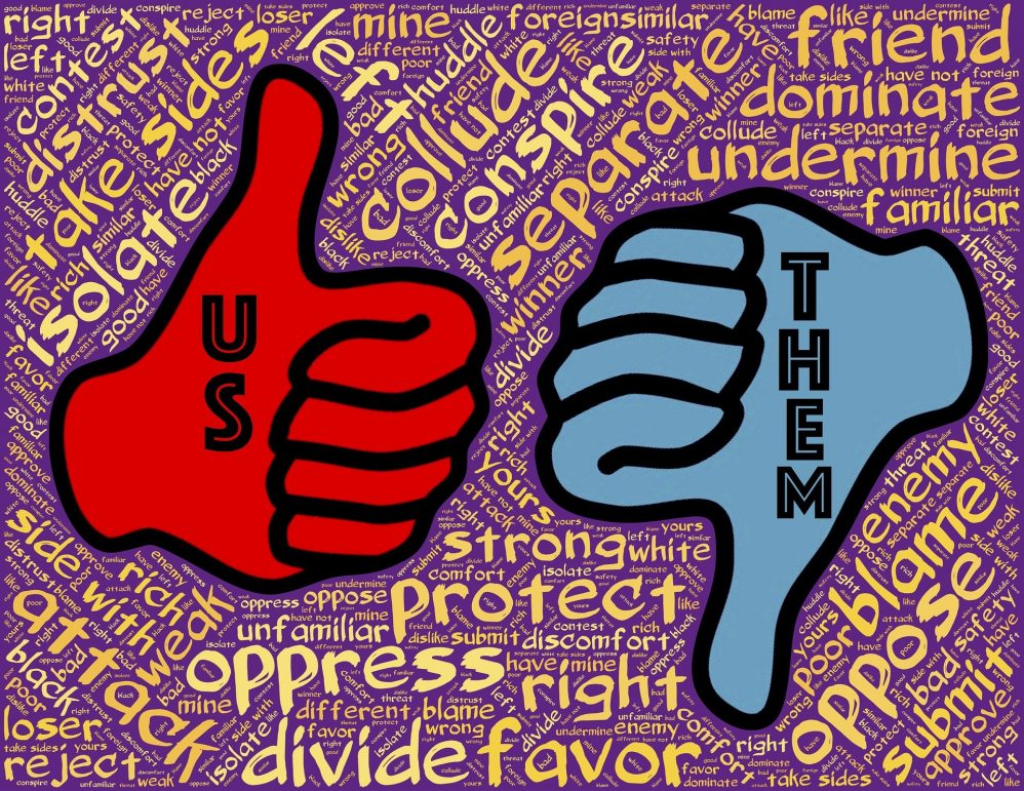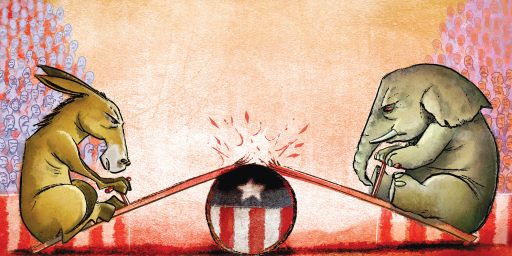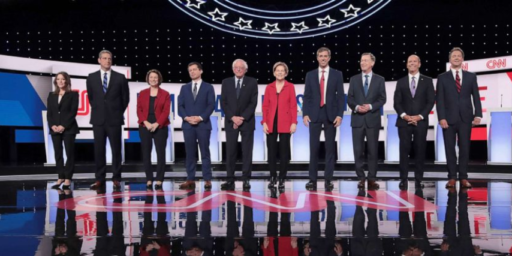On Moderate Legislative Power and Other Political Dreams
A bloc of moderates is not coming to a Senate near you.

There is a common and persistent fantasy that pervades political punditry. It is a fantasy that is appealing, and it is one under which I have sometimes fallen sway. It is the fantasy that office-holders are primarily motivated by policy outcomes and, therefore, they all actually want to legislate.
This is not correct.
All elected office-holders are first and foremost concerned with re-election. Policy outcomes come in second at best (and for some, it may rank further down the chain behind things like prestige, self-erichment, or simply setting up the next gig).
Ultimately, even if one is a diehard policy wonk, one knows that to pass policy one has to get re-elected.
Re-election, re-election, this is the law and prophets to a member of Congress.
One has to be in power to exercise power, regardless of motivations.
The gateway to elected power in the United States, almost unfailingly, is via either the Republican Party or the Democratic Party. One may wish it was otherwise, but it is nonetheless true. The exceptions truly prove the rule by being so darn rare.
The gateway to control of the party label in a given contest is almost certainly the party primary, which requires appealing to a specific set of voters who tend to have pretty strong views about politics.
Moreover, if we are talking about Congress then it is essential to understand that the entire organizational structure of the US Congress is oriented around the two parties (specifically around the party with the majority of seats). So much so that even “independents” like Senator Bernie Sander of Vermont essentially organizationally end up working with one of the two parties. Bernie may be independent, but he is hardly floating between the two parties legislatively speaking.
Any assessment of congressional behavior has to take all of this into account.
All of this is the preface to a discussion of a piece that was suggested to me in a recent comment thread, A Moderate Proposal by Matthew Yglesias and Steven M. Teles in The Atlantic. It is the latest in a seemingly unbroken chain of elite pundits who are just certain that some kind of coalition of moderates can solve our political woes. (I will note that Teles is a professor of political science at Johns Hopkins University, and therefore I don’t want to suggest he is a random pundit. He has published extensively on the subject of American political parties).
The basic notion is this:
despite being decisive for both electoral outcomes and legislative-vote totals, moderates exert much less influence over the political system than they could. If they worked together, they could set the system’s agenda, make our political institutions more functional, and maybe save democracy itself.
[…]
Imagine, as a start, that somewhere from six to nine senators agreed to work together, either as a formally separate party or through an agreement of factions in either party. The moderate bloc would enter into a coalition with whichever party’s leaders offered it the best deal to change the rules under which the body operates.
First, the seeds of the problem in their analysis can be seen in the notion that moderates are “decisive for…electoral outcomes.” As I have written about before the decisiveness of “moderates” is largely overblown as a general proposition, and it is decidedly not the case that they are necessarily decisive in a given congressional election. (The assertion in the piece seems to conflate, as is often the case, the “moderates” with the “independent” and “undecided” categories. I would again point to Lee Drutman’s piece on that general topic.
For example, one of the Republicans cited in the piece as a potential member of this moderate bloc is Mitt Romney. I get it, he had the courage to vote to convict Trump. But he hardly comes from a moderate state and there is no way in which moderate voters were “decisive” in his election nor in any possible re-election.
Still, as a mathematical assertion, the notion that a moderate bloc could act as a coalition partner to influence the larger majority party in the chamber is theoretically defensible. However, I would argue that it only works if we assume that the dynamics of American political parties, both electorally and with the legislature, are radically different than they actually are.
The fundamental question, which links to my introduction to this piece, is what are the incentives in place for Senators to behave as Yglesias and Teles suggest? I look at this proposal and I wonder first, what is the supposed unifying set of goals that would cause them to break from their parties to behave as described (especially the moderates from the minority party)? From there I especially wonder as to which of those goals is worth the given Senator’s political career?
Let’s think about this proposal in the context of the current Senate, which would mean some number of “moderate” Republicans being willing to cut deals with the Democratic leadership. What Republican is going to be willing to do that knowing that the immediate response of their colleagues and the conservative press would be to label them a RINO (if not more likely, a traitor)? Such behavior would very likely result in a primary challenger and also the loss of some campaign contributions.
Plus, one of the main strategies of the party out of the majority is to try and paint the majority as ineffective, if not incompetently impotent. Having five or so members of the minority party to help the majority party pass legislation (even if it is more “moderate” legislation) is still giving the majority party a win (if not a set of wins). From a political strategy point of view, the incentives don’t run this direction (and is a major reason why we don’t see it happen).
As I often stress, the remarkable and resilient strictness of our two-party system means that most political calculations are truly binary. There is little room for the kind of strategic coalitional legislating that the piece advocates for.
Further, the piece seems to ignore that the way the majority party becomes the leadership party that sets the agenda is to have an absolute majority of seats. Now, in theory, a break-away third party of moderate could be a king-maker (if neither party had a majority). But it would have to function in coalition with either the Rs or the Ds. While one would expect such a coalition to come with strings, such as guaranteed votes on certain legislative goals of the Moderate Party, the majority party would still control the agenda, And while in theory, the Moderate Party could switch back and forth, who wants a partner like that? That way lies significant dysfunction (even more than we have now).
Interestingly, the notion of factional balancing on a given issue, which constantly shifting majorities is how James Madison thought legislatures would work. But remember how I always point out how the Framers didn’t understand parties and the role they would play in legislatures? Well, Yglesias and Telles make a similar mistake in this article because they are ignoring the role parties play in nominating and electing Senators and, moreover, the way parties organize legislative bodies.
I understand the appeal, but not only do two-plus centuries suggest that that isn’t how legislatures tend to function, but is it incredibly difficult to look at contemporary politics and see a way forward for such behavior. Remember, we are at a stage in our politics wherein being willing to say that Joe Biden legitimately won the election is potentially dangerous to the political fortunes of Republican members of Congress. How much more would it hurt such a politician to be seen as helping the Democrats?
But, what if they formed a third party? That would be great, but what are the odds they would win re-election as members of a new third party? The answer is: a lot lower than running for re-election under their current party labels. A lot lower.
In other words: the proposal ignores the substantial role played by party affiliation as linked to re-election.
BTW, if such a scenario would work (i.e., a moderate faction driving the legislative agenda in the chamber) why are Manchin and Sinema not using their position to achieve actual goals instead of just obstructing? Perhaps this scenario is not all that it is cracked up to be.
Look, I get the appeal. But it utterly ignores the basic incentives structure of our electoral politics, as well as the organizational politics of the Senate.
I will say that the basic notion is not a bad one, but it could only emerge if we had very different electoral incentives, i.e., ones that would better allow a multi-party system to develop. This fact underscores the way in which political behavior is directly a result of the inventive that politicians have and how the system links those incentives to governing behavior and then functions as a feedback loop. As it stands, we are getting exactly the kind of behavior that the system itself incentivizes, which is (among other things) making legislation largely into a zero-sum contest wherein floating blocs of compromise-oriented Senators are rather unlikely to appear.






It’s been noted that we live in an unusual time. Through most of our history one party or another has been dominant. Most recently Ds from 1933 thru 1980, you know, the good old days. Having two parties with such parity is odd. Most things would be adjudicated within the dominant party, with the minority party able to bargain with votes on issues that split the dominant party. At the moment, Rs seem to have no interest in bargaining for anything.
Once upon a time I liked Yglesias, but he seems to have gone full on Andrew Sullivan. Especially since he’s gone Substack where he has no editors and his first priority is his brand. Glancing at Yglesias’ history on WIKI I find that Sullivan does an “Yglesias Award” to honor ” writers, politicians, columnists or pundits who actually criticize their own side, make enemies among political allies, and generally risk something for the sake of saying what they believe.” (Which, as with Sullivan himself, is driven more by marketing than integrity.) But the real yuk, in the context of the article quoted here, is that it was Yglesias who coined the term “pundit’s fallacy”, “the belief that what a politician needs to do to improve his or her political standing is do what the pundit wants substantively.”
The whole premise is a classic example of begging the question. Implicit in this whole proposal is that there is a moderate position which is different from the mainstream Republican or Democratic positions, but I see no evidence for that whatsoever.
Utah is Mormon Country, and it’s a mistake to lump them in with the rest of the Republican base — on issues such as the Child Tax Credit, Romney likely is in play.
(If the Democrats chop down the BBB to what Manchin will accept, a clever way to kill it would be to have Romney propose an amendment to fund the expanded Child Tax Credit, and bring along a few Republicans. Try to insert a poison pill to Manchin’s left, and then vote against the whole thing because of “socialism”. It will fail only if other Democrats vote against the CTC)
The infrastructure bill suggests that the basis of your question might be wrong.
I would ask “why do Manchin and Sinema want so little?”
The answer may well be that they’re small people who are squandering and opportunity to reshape America to their liking because they have little imagination.
@gVOR08:
If you believe this, you haven’t seen what Andrew Sullivan has become.
Yglesias does not like the performative progressives, but is very firmly left of center. He will engage in performative eye rolls, and he enjoys being a troll, but he doesn’t let spite change his core values, which have always been Democrat back bencher.
@Gustopher:
This is true when it comes to, say, support for Trump.
But the notion that Utah is a place wherein Mitt is going to cultivate a moderate voter base strikes me as fantastical.
@Gustopher:
This is my biggest frustration with Yglesias. He really does enjoy trolling on Twitter. And he also makes it hard, sometimes, to know when he is trolling and when he is being serious. This annoys me because it gives him the “you can’t take a joke” defense when he says something truly dumb. And I think does this very deliberately.
I do concur with @gVOR08 that he is rather obviously brand-focused these days.
I do agree that Sullivan is a whole other kettle of fish. Yglesias I still take seriously.
@Gustopher:
Maybe, but I don’t think so.
Their leverage grew considerably after that bill was passed. And they have not used it in any constructive way.
@Steven L. Taylor:
Not moderate, but a very different version of pro-family that isn’t just “I heard there were trans people somewhere.”
I think there are two interrelated developments that have a lot to do with the disappearance of a moderate bloc in Congress. First, the insatiable media appetite for news to cover (even if the stories are contrived). Second, how easy it is for Senators and Congresspersons to get media exposure, and strident voices get attention. Nothing is going to turn Joe Manchin into Daniel Patrick Moynihan and turn Ted Cruz into Dick Lugar. Moderation is so un-entertaining.
The more interesting question to me is what this “moderate agenda” is likely to look like. I submit that were the “moderates” to take control, we would see
*Racism Lite–certainly we don’t want to lynchings or anything, but for the most part, our racial differences are mostly behind us and we should consider policy items with that in mind.
*Means-tested Everything–This IS “WE THE PEOPLE’s” money after all. It’s important that we help those less fortunate without incentivizing laziness and opportunism among those who make their living sponging off others.
*No CTC–It’s not the role of government to lift people out of poverty and we wouldn’t be able to do it even if we tried. Free money just for “popping out babies” is a perverse incentive.
*No citizenship for Dreamers, ever–It’s destructive enough to our national continuity that we need to allow them to stay at all. Amnesty will only encourage other Third Worlders to continue to break our laws.
Universal Preschool–Meh… Isn’t that really a back door initiative to granting benefits for which they shouldn’t qualify to people who shouldn’t be here in the first place?
Social Safety nets–Should be kept as small as is practical. Perverse incentives and all that.
Medicare for All–Are you kidding me or something? Turning Medicare for our elderly into just another socialized medicine scheme is a terrible idea.
I could go on. America IS still center right, so draw your own conclusions,
@Just nutha ignint cracker: So a George W. Bush era Republican congressman? (W. was in favor of immigration reform, but his party was not)
Also, school vouchers. With a split on whether they can be used for cash for homeschooling.
If Manchin, Murkowski, Romney, Sinema and maybe Angus King were to sit down and decide that they wanted something — pretty much anything — they would get it to happen. There’s just no real desire from them other than a slowly deteriorating status quo, and some bridges.
@Just nutha ignint cracker: But what you list is simply Republicanism. They are against everything except tax cuts for the wealthy and weakening environmental laws. If all these moderates are going to do is oppose everything, then they are indistinguishable from the Republicans as a whole. And if they were willing to buck their party on specific votes, they would have done so already.
Look at what the Dems were willing to do for two Democratic Senators. Can you imagine what they would have been willing to do to bring a couple of Republicans on board? If these mythical moderates actually had something significant they wanted to accomplish they would have had almost limitless leverage during the BBB negotiations. But Republicans, without exception, do not want to accomplish things. They want to stop things. And reward wealthy benefactors. What pundits perceive as moderates are simply Republicans and Democrats who wished they wouldn’t get yelled at so much, and will complain to these columnists in strictest privacy. The idea that they represent a middle ground willing to organize and negotiate is laughable.
@MarkedMan:
Well, DUH! Unless your tongue was firmly in cheek with the opening sentence. The myth that the USA is anything except a moderate-right quasi-democratic nation at this point, is, I’m afraid, tattered.
@Gustopher:
What do we want? To be re-elected! When do we want it? Next Election!
@gVOR08, @Gustopher, & @Steven L. Taylor:
My take on current Yglesias is that it’s a mix of everything you’ve cited. For whatever reason, his brand–like a lot of other “liberal” pundits–has increasingly become “heterodox.” And when you exist in more of a closed media ecosystem, like Substack, I think that can create a really toxic feedback loop with your audience. In part, what I think happens is you begin to attract more folks from the opposite side of the political spectrum (the “Even a liberal like Yglesias” agrees we’re right).
It’s incredibly difficult to prevent that shift in your audience from having an impact on the material you produce. After all, you have all these smart people following you telling you that your right–that you see things more clearly than your peers. And your substack subscriptions keep going up, so you must be doing something right. So you double down on the heterodoxy. And then double down again…
And again…
@Just nutha ignint cracker: collapsing non-adherence to faculty lounge and uni campus culti-Left ethno-identarian politics into racism lite is rather one of the problems you face in broadening a winning electoral footprint.
@Lounsbury:
I can’t decide if you are joking, but I suspect you aren’t?
(For one thing, I would love to know where the faculty lounge is…).
@mattbernius: The fact that his income is linked to those subscribers only deepens the cycle to which you refer.
@Steven L. Taylor:
I should have included that, but I didn’t want to be accused (or appear to accuse him) of reducing everything to crass commercialism.
@Steven L. Taylor: No I am not joking mate, and arch faux literalism on the part of the over-educated is one of the boring symptoms of the problem.
Were it not for Trump I should be merely amused.
@Lounsbury:
Or, in this case, it might mostly be a reaction to an overly pompous formulation that honestly sounds like self parody, but one’s mileage may vary.
It is also an observation that trite assertions about supposedly chummy echo chambers filled with self-congratulatory professors is more than a bit overwrought.